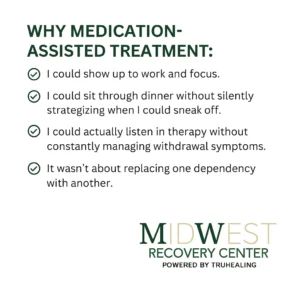I always believed in science. I believed in data, studies, outcomes, and evidence. I’d never skip a flu shot, I tracked my sleep, and I took pride in being a logical thinker.
But when it came to my substance use—when things finally reached a point I couldn’t ignore—suddenly, science felt like the wrong tool.
Why?
Because the loudest voices in recovery made it sound like I had to choose between medication and “real” sobriety.
I thought: If I use meds to get better, does that mean I’m not really better?
Turns out, I had it backward. Medication-Assisted Treatment (MAT) didn’t water down my recovery—it made it possible.
This is how I learned that science and recovery don’t just coexist. Sometimes, they need each other.
I Looked Fine—But I Was Not Okay
I was the person who could keep it together at work, manage the carpool schedule, hit the gym occasionally, and never once get a call from HR. No one would’ve guessed I was using more than just caffeine to stay afloat.
I wasn’t crashing. I was coasting—on stimulants, pain meds, alcohol. Whatever helped me stay sharp, stay present, stay functional.
But underneath, I was coming undone. Quietly. Logically. The way high-functioning people break: not with a bang, but with a slow, silent unraveling.
I tried to stop on my own. I even made it a few days here and there. But my body would start screaming. The cravings weren’t just urges—they were survival-level demands.
That’s when I knew I needed more than willpower. I needed help that actually matched the level of what I was up against.
Medication-Assisted Treatment Wasn’t What I Expected
When I first heard about MAT, I dismissed it. “That’s for people deep in it,” I thought. “Not for people like me.”
But then a peer in a support group said it had helped her stay grounded long enough to start therapy. She described her experience like scaffolding—something that held her up while she rebuilt herself.
That image stuck with me. And I realized maybe what I needed wasn’t a dramatic intervention or a 30-day blackout from life. Maybe I just needed support that worked.
That’s when I looked into Medication-Assisted Treatment in Toledo, Ohio at Midwest Recovery Center.
MAT Gave Me Breathing Room
The first thing I noticed after starting MAT was that I could think clearly. My body wasn’t hijacked by cravings anymore. I wasn’t white-knuckling every meeting, every conversation, every hour between uses.
I started with buprenorphine—under medical supervision—and added weekly therapy and group sessions. For the first time in years, my recovery didn’t feel like punishment. It felt like relief.
I could show up to work and focus.
I could sit through dinner without silently strategizing when I could sneak off.
I could actually listen in therapy without constantly managing withdrawal symptoms.
That breathing room? It gave me space to finally start healing instead of just surviving.
It Wasn’t About Replacing One Drug with Another
This was one of my biggest hang-ups. Was I just swapping substances?
But the truth is, MAT medications like buprenorphine, naltrexone, and methadone don’t create a high when taken as prescribed. They stabilize. They balance brain chemistry. They reduce the overwhelming need to use.
At Midwest Recovery Center, everything was medically supervised. My treatment plan was built around my needs—not a one-size-fits-all model.
It wasn’t about replacing one dependency with another. It was about reducing the chaos enough to actually recover.

What Opened Me Up to MAT Was Honesty—Not Pressure
No one at Midwest Recovery tried to sell me on MAT. They explained it. Gave me the pros and cons. Talked to me like an adult who deserved options.
And that’s what broke through my defensiveness. I wasn’t talked at. I was talked with.
They asked me:
- What’s worked for you in the past?
- What’s your day-to-day reality?
- What are you afraid of?
It was clear they’d worked with high-functioning people like me before—people who needed support and privacy, structure without shame.
And if you’re looking for Medication-Assisted Treatment in Perrysburg, Ohio or Lambertville, Michigan they’ll do the same for you.
Recovery Doesn’t Have to Hurt to Work
I used to think that recovery only counted if it was brutal. That if I wasn’t crying, shaking, and scraping my way through it, I wasn’t doing it right.
But that’s not healing. That’s suffering.
MAT helped me heal in a way that didn’t destroy my schedule, my career, or my identity. I got better in real time—without stepping away from my life.
And honestly? That’s the only way it was ever going to work for me.
What I Tell Other “High-Functioning” People Now
I’ve had friends quietly reach out, just like I once did. People who are doing “fine” on the outside but know something’s off. The ones who whisper, “I don’t think I’m an addict… but I also can’t stop.”
To them, I say:
You don’t have to call it anything yet.
You don’t have to declare anything.
You just have to stop pretending you’re okay if you’re not.
If you’re constantly negotiating with your substance use…
If you’re afraid of what quitting might do to your life…
If you’re looking for help that feels doable…
Then yeah—MAT might be the thing that finally makes recovery possible.
FAQs About Medication-Assisted Treatment
What exactly is Medication-Assisted Treatment?
MAT combines FDA-approved medications (like buprenorphine, methadone, or naltrexone) with counseling and behavioral therapies. It’s designed to treat substance use disorder in a comprehensive, evidence-based way.
Will MAT make me feel high?
No. These medications are carefully managed to stabilize your brain chemistry, not get you high. You’ll feel more normal, not impaired.
Is MAT just for opioids?
While MAT is commonly used for opioid use disorder, it’s also effective in treating alcohol use disorder. The medication used will depend on your unique situation and needs.
Can I still go to work or care for my family while on MAT?
Yes. In fact, MAT is ideal for people with daily responsibilities. It allows you to recover while maintaining your routines and commitments.
Is MAT forever?
Not necessarily. Some people use MAT short-term, others long-term. You and your treatment team will decide what’s best for your recovery timeline.
Is Medication-Assisted Treatment confidential?
Absolutely. Clinics like Midwest Recovery Center maintain full confidentiality, and you don’t need to disclose your treatment to anyone unless you choose to.
You Don’t Need to “Prove” Your Pain to Get Help
If you’re still showing up to work, keeping the house clean, making deadlines—but you know something isn’t right—this is your sign.
You don’t have to spiral to earn treatment. You don’t have to prove how bad it is to get support. And you definitely don’t have to reject science to recover.
Medication-Assisted Treatment gave me permission to get better in a way that worked for my life.
Maybe it can do the same for you.
Want to explore a recovery path that makes sense for your life?
Call (888) 657-0858 to learn more about our Medication-Assisted Treatment services in Toledo, Ohio.


























